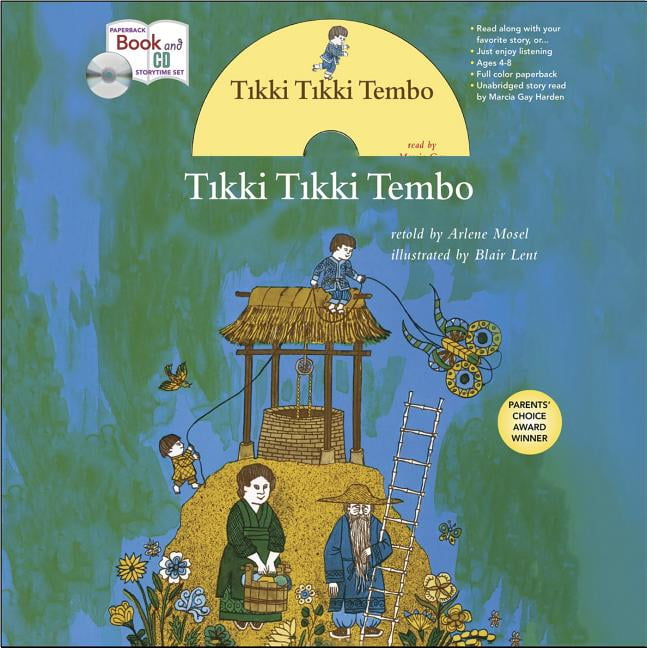
7.1 Tikki Tikki Tembo in popular culture.Using Multiethnic Literature in the K-8 Classroom, pp. "Asian Pacific American Children's Literature: Expanding Perceptions About Who Americans Are". " Tikki Tikki Tembo and Cultural Accuracy in Folktales". ^ Beeson, Kristine Diane Locatis & al."Long-Name-No-Can-Say: Nicki Nicki Tembo". ^ National Association of Junior Chattaqua Directors."Born to Rebel", San Francisco Chronicle, March 25, 2009. School Library Journal "A Fuse #8 Production" blog. ^ National Education Association (2007).^ " CHILDREN'S BOOKS 50 Years of Children's Books"." Caldecott-Winning Blair Lent Dies at 79". ^ "From the folktale retold by" Mosel, Arlene." Long Name No Can Say", told by Paul Wing.Tikki Tikki Tembo, a dramatic reading of the book hosted at Youtube.
#TIKKI TIKKI TEMBO BASSNECTAR FULL#
The song "Wildstyle Method" by Bassnectar says Tikki Tikki Tembo's full name during certain parts of the song. Other oddities exist, such as bowing backwards and having the boys eat rice cakes instead of mooncakes during the "Festival of the Eighth Moon", presumably meaning the Mid-Autumn Festival. No similar Chinese word means "little or nothing". It has been criticized for "reinforc the stereotype that Asian names sound like nonsense syllables," especially as the name of the title character is nothing like actual Chinese and the common name Chang ( pinyin Zhāng) is a surname and not a given name. Others see it as a fictional tale based surreptitiously on a foreign land. Some Chinese have felt the story to be offensive as it seems to depict their language and culture inaccurately, while claiming to retell an actual Chinese folktale. Similar stories set in America include the folksong "(Eddie Kucha Kacha Kama Tosa Nara Tosa Noma) Sama Kama Wacky Brown" recorded in 1960 by the Brothers Four on their eponymous first album. Mosel claimed to have heard the story as she told it, with the name starting "Tikki Tikki".

#TIKKI TIKKI TEMBO BASSNECTAR PRO#
This was kept in a 1961 Golden Press version about an older brother named "Sticky Sticky Stumbo Nos E Rumbo E Pro Pennyo Hara Bara Brisko Nicky Prom Po Nish No Menyo Dumbricko" and called "The Little Boy With the Long Name" and by Arlene Mosel's book. It is possible that a later version of the story with a fat elder brother named "Nicki Nicki Tembo No So Rembo Oo Ma Moochi Gamma Gamma Goochi" called "Long-Name-No-Can-Say" was the first to change it to a Chinese setting. A version of the story related in The Frog's Saddle Horse and Other Tales, published the same year as Tikki Tikki Tembo, cites a story about a boy named "Tikki-tikki-tembo No sa rembo Hari bari brooshki Peri pen do Hiki pon pom Nichi no miano Dom boriko" in "old Japan" included in the 1924 Through Storyland with the Children.

It has been suggested that the story originated from the very similar Japanese rakugo about Jugemu Jugemu Gokō-no surikire Kaijarisuigyo-no Suigyōmatsu Unraimatsu Fūraimatsu Kūnerutokoro-ni Sumutokoro Yaburakōji-no burakōji Paipopaipo Paipo-no-shūringan Shūringan-no Gūrindai Gūrindai-no Ponpokopī-no Ponpokonā-no Chōkyūmei-no Chōsuke rather than from any Chinese folklore.

The story presumes to function as an aetiological myth about why Chinese names are so short today. He then goes to get the Old Man with the Ladder, initially the old man doesn't respond but after Chang repeats his brother's predicament the old man goes with Chang to save his brother from the well. He says it over and tells Chang to get the old man with the ladder.

Chang runs to their mother and shouts that "Tikki Tikki Tembo-no Sa Rembo-chari Bari Ruchi-pip Peri Pembo has fallen into the well", but she can't hear him. Some time later, the boys are again playing near the well. Chang falls in the well, his older brother runs to their mother, tells her Chang has fallen down the well, and Chang is rescued. A boy named Tikki Tikki Tembo-no Sa Rembo-chari Bari Ruchi-pip Peri Pembo ("The Most Wonderful Thing in the Whole Wide World") and his little brother Chang ("Little or Nothing") are playing near a well they'd been previously warned by their mother to avoid. Tikki Tikki Tembo is set in ancient China and invents an ancient Chinese custom whereby parents honor their first-born sons with long, elaborate names that everyone is obliged to say completely – no nicknames, no shortening of any kind – while the second-born sons are typically given short, unimportant names.


 0 kommentar(er)
0 kommentar(er)
